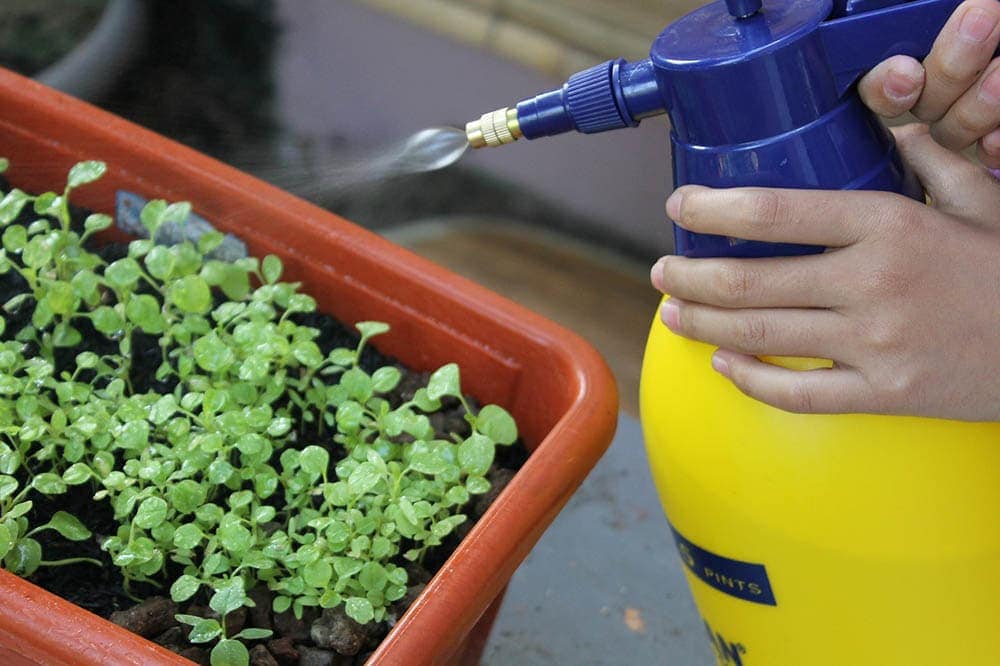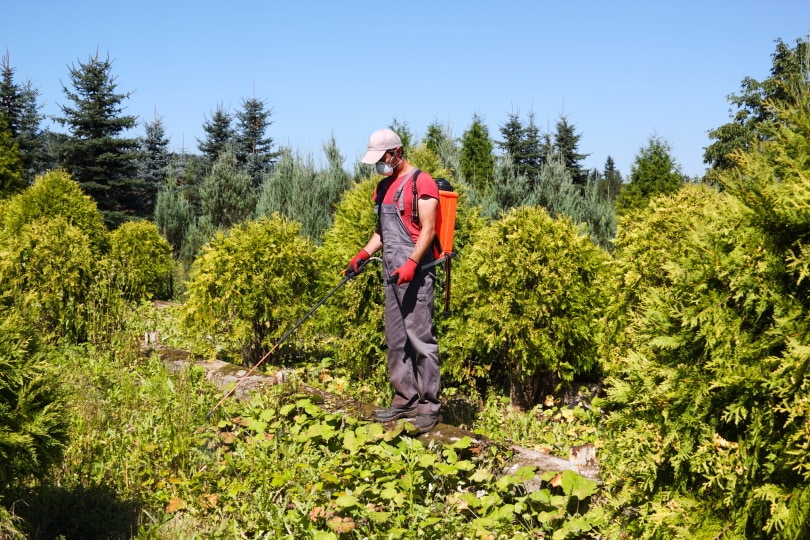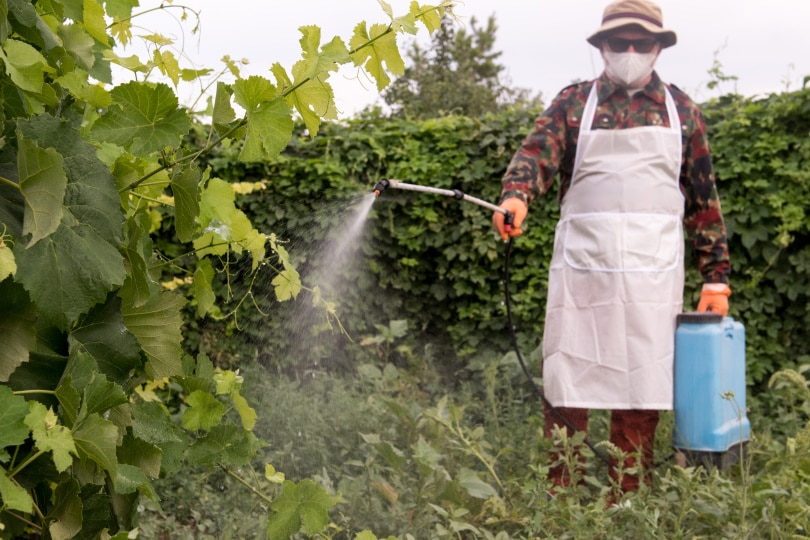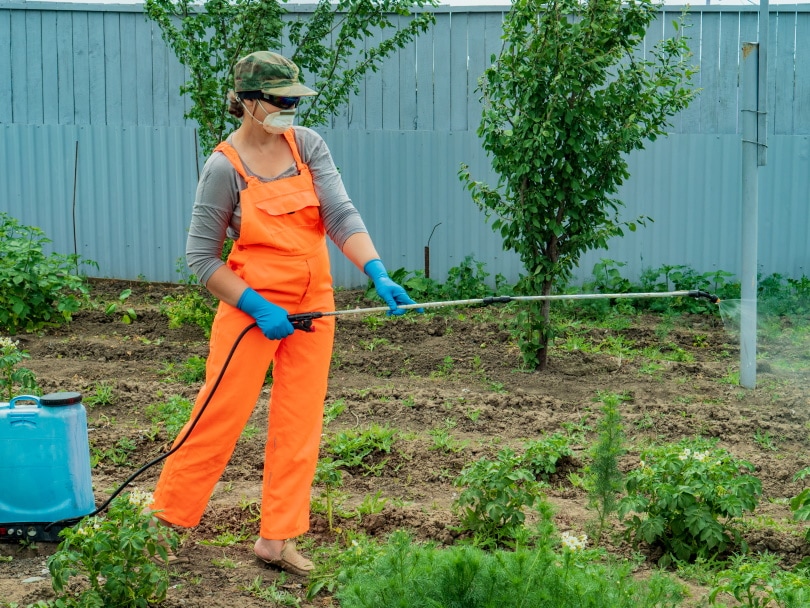What Are Organic Pesticides? Pros, Cons, & FAQ
-

- Last updated:

Pesticides are a necessary evil for intensive gardening and farming. Pesticides help keep bugs away from your beloved plants and kill pests before they become a problem. People who do not use pesticides often find their plants besieged by pesky insects that can undo hours, or even months, of work in just a few days.
Many gardeners insist on using all organic materials in their gardens. They say they are safer and healthier than synthetic pesticides. Organic sounds better than synthetic, and that label makes a lot of people believe that organic materials are superior to inorganic or synthetic materials. But is that true? Are organic pesticides safe for your garden? What exactly are organic pesticides in the first place? Organic pesticides work by killing and repelling insects with materials derived from entirely natural means.
How Does It Work?
Natural pesticides come from things in nature, such as plants, animals, and minerals. That is opposed to conventional pesticides, also called synthetic pesticides, which are created in a lab for specific purposes or maximum efficacy.
Natural pesticides often target specific mechanisms of bugs to kill them. When natural pesticides cannot effectively kill bugs, they can often be deployed as a repellent or deterrent instead.
What Are the Different Types of Organic Pesticides?
There are numerous different types of organic pesticides. The definition of organic is fairly broad, which leaves many different options available for use in a garden. Organic pesticides can be derived from plants, animals, or minerals but plants and minerals are the most common by far.

Plants
There are numerous types of plants that can be used for pesticide purposes. Plants are some of the most effective and common materials to use for organic pesticides. Plants can be crushed, turned into powder, used in sprays, or turned into oils that are then used in gardens as organic pesticides.
Animals
Organic pesticides derived from animal material are less common than organic pesticides derived from plants or minerals. However, there are still some niche options that are used in specific situations. Some examples of organic pesticides that come from animal materials include dead animal odor and animal urine. In specific cases, these types of pesticides can be effective pest repellents.
Spinosad is another animal-derived pesticide that comes from bacteria and is one of the few broad-ranged organic pesticides:
- Animal odors
- Animal urines
- Spinosad
Minerals
Minerals are natural materials found in the soil and crust of the Earth. Minerals are a common source of organic pesticides. Minerals can be used raw or in sprays to create effective repellents and killers for insects and other pests. There are numerous types of minerals that are effective pesticides, and many of them can be found in a typical home.
- Salt
- Mineral oil
- Diatomaceous Earth
- Sulfur

Where Is It Used?
Organic pesticides are used for two main functions and for two different capacities. Organic pesticides are used in gardens and farms. The size of these gardens and farms stretches from simple plots found in residential yards to massive operations that can stretch for multiple acres.
Farmers and gardeners alike use organic pesticides for two different reasons. The first reason is for simple peace of mind or personal beliefs. Some people simply believe that organic is better, and there is nothing wrong with that. The other reason is to gain, keep, or maintain an organic label. Plants grown in organic conditions can gain the label of fully organic, which can be used to sell in certain markets or fetch a higher price than non-organic products.
Advantages of Organic Pesticides
Organic pesticides have a few benefits. First, since they are more selective, they have less potential to harm unintended targets. For example, organic pesticides are less likely to kill butterflies if you want to keep butterflies in your garden than synthetic pesticides. Organic pesticides make it easier to do an integrated pest management plan with than synthetic pesticides, and that is because of how selective they are.
Organic pesticides can also help obtain an organic label. If you use any synthetic pesticides on your garden at any point, you are usually disqualified from ever obtaining an organic label for those particular plants. Organic pesticides help to keep an organic certification intact without having to think about it.
Disadvantages of Organic Pesticides
There are some downsides to using organic pesticides. First, they are usually less potent than synthetic pesticides. That means they require more frequent application, and they stick around for a shorter amount of time than their synthetic counterparts. The need to reapply organic pesticides over and over again can be a drain on someone’s time and money.
Organic pesticides are also often less potent than synthetic pesticides, and they are more particular. That means that you have to do more research in order to find effective organic pesticides that will work for particular pests. There are not very many organic pesticides that will broadly kill a large number of insects. Things like salt work great for slugs, but they won’t do very much against ants. In comparison, synthetic pesticides usually target a far higher number of bugs in one go than organic pesticides.

Frequently Asked Questions (FAQs)
Are Organic Pesticides Safe?
Just because something is organic does not automatically make them safe. Cyanide is technically organic because it can be readily found in nature, but cyanide is highly lethal. Organic pesticides can be dangerous, but they can also be safe. Similarly, synthetic pesticides can be dangerous, but they can also be safe. Organic pesticides can still be toxic, lethal, or poisonous.
The one benefit that organic pesticides have over synthetic pesticides when it comes to safety is that you can usually tell what an organic pesticide is at first glance. Most people know what sulfur is. Most people know what salt water is (which can also be toxic and lethal.) Most people know how dangerous chili pepper or tobacco is. It is harder to parse the danger of synthetic pesticides because they have names like triclopyr or glyphosate. How dangerous is glyphosate? Few people know off the top of their heads.
Are Organic Pesticides Effective?
Organic pesticides can be very effective in certain situations. You usually have to match up specific organic pesticides with specific pests to get the most efficacy from them. Organic pesticides are generally milder than synthetic pesticides, and therefore, they require more particular foreknowledge to make them as effective as possible.
For example, if you have a problem with a specific type of caterpillar, the best way to use an organic pesticide is to find a natural substance that naturally deters or kills that specific type of caterpillar. With synthetic pesticides, you just have to buy an all-around bug-killing agent rather than something more specific.
Organic pesticides are effective, and they can be very effective in the right situations, but they are not always effective. If you use the wrong organic pesticides on the wrong types of pests, you will not see very encouraging results.
Can I Get Away with Not Using Any Pesticides?
Pesticides, in general, are potent and potentially harmful. Some people do not like the idea of putting pesticides on any of their plants, especially food-bearing plants. Can you get away without any pesticides? In some cases, you can get away with using no pesticides. However, that will be determined by your individual situation. Some small gardens will be able to escape pesticide use if bugs are not an issue. The larger the garden or farm, the more likely bugs will cause a problem, and the more likely pesticides will need to be used to control the insects.
Final Thoughts
Organic pesticides are derived from plants, animals, or minerals and can be used in gardens to achieve or maintain an organic label. Just because some pesticides are organic does not make them safer or less toxic than synthetic pesticides. The toxicity of a material is not tied to whether it is synthetic or organic. Choosing between synthetic or organic pesticides will come down to your individual garden, goals, and beliefs.
Featured Image Credit: mayapujiati, Pixabay
Contents



